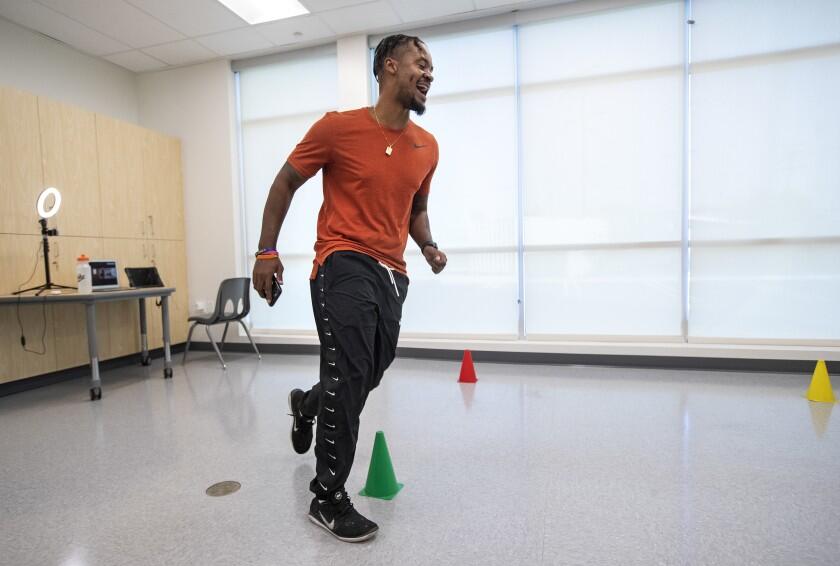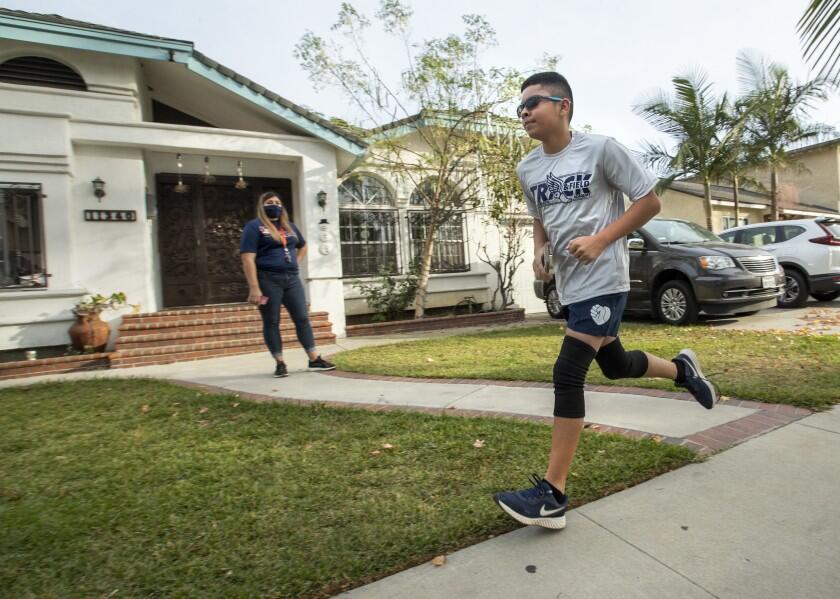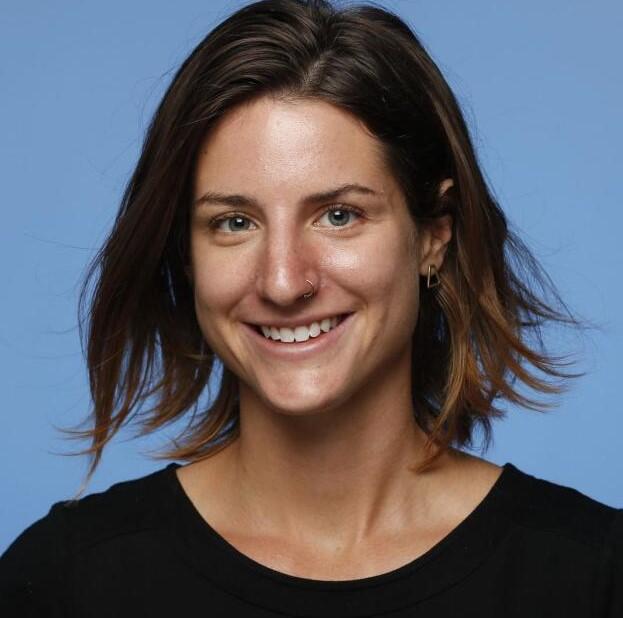
Alfredo Crossman-Chávez Jr., a physical education teacher and athletic director at KIPP Corazón Academy, a charter school in South Gate, flexes his muscles with fellow PE teacher Dean Bhatt, seen on the left side of computer screen. (Mel Melcon / Los Angeles Times)
By: Paloma Esquivel, Julia Barajas, Laura Newberry, LA Times
Nearly nine months and counting — that’s how long more than 1 million L.A. County students have been out of school. It’s only a guess when campuses will reopen amid the alarming surge in coronavirus cases. But talk to educators, parents and students and they invariably know someone who has made a difference. Someone who identified a pain point with distance learning, attempted to fix it and moved schooling forward during this unprecedented disruption to education.
They are brothers, worried mothers, creative teachers and college professors inventing new ways to teach familiar lessons. They are community builders who motivate students isolated behind computer screens.
These are some of their stories.

Physical education teacher Alfredo Crossman-Chávez Jr. jogs around cones in a classroom while teaching a lesson about cardiovascular endurance. He told his online students to follow along by setting up a similar course at home to jog or walk around in a timed manner. (Mel Melcon / Los Angeles Times)
Alfredo Crossman-Chávez Jr. is a problem solver — and this physical education teacher and athletic director at KIPP Corazón Academy has plenty of challenges that have nothing to do with sit-ups.
How does he teach hand-eye coordination when his kids don’t have the right equipment at home? Crunch paper into balls. How does he deal with bad internet connections when so much of their exercise needs to take place outside twice a week? Record four sessions, doubling students’ chances to log on.
Crossman-Chávez finds ways to meet students where they want to be — and it’s not on Zoom.
He and a colleague at the South Gate school make strategic use of social media. There’s the “KCA Upper School P.E.” YouTube channel with yoga and high-intensity exercises. He launched the “kippcorazon_athletics” Instagram page, where he livestreams teacher vs. student athletic challenges that sometimes culminate with him drenched in ice water.
Determined to launch a cross-country team, he used Zoom, Google Classroom and the Nike Run Club App to virtually train and keep track of the runners’ progress.

Nathan Rodarte, a seventh-grade cross-country runner at KIPP Corazón Academy in South Gate, does a 10-minute warmup exercise outside of his home in Lynwood while his mother, Denise Hernández, watches. (Mel Melcon / Los Angeles Times)
“Coach Chávez is always pushing, always wants the best from us,” said seventh-grader Nathan Rodarte, who is team captain.
Among his other teaching duties? Crossman-Chávez guides students through nutritious meal preparation. And for fun he hosts the “Anime Club,” because the biggest problem he’s solving is to keep isolated adolescents engaged.
“This can’t be all work — especially not on the computer,” he said.
Read the full story, here.
.jpg?mask=256) About the Authors: Paloma Esquivel is an education reporter for the Los Angeles Times. She was on the team that won the 2011 Pulitzer Prize for public service for investigating corruption in the city of Bell and the team that won the 2016 Pulitzer Prize for breaking news for coverage of the San Bernardino terror attack. Prior to joining The Times in 2007, she was a freelance writer, worked in Spanish-language radio and was an occasional substitute teacher. A Southern California native, she graduated from UC Berkeley and has a master’s in journalism from Syracuse University.
About the Authors: Paloma Esquivel is an education reporter for the Los Angeles Times. She was on the team that won the 2011 Pulitzer Prize for public service for investigating corruption in the city of Bell and the team that won the 2016 Pulitzer Prize for breaking news for coverage of the San Bernardino terror attack. Prior to joining The Times in 2007, she was a freelance writer, worked in Spanish-language radio and was an occasional substitute teacher. A Southern California native, she graduated from UC Berkeley and has a master’s in journalism from Syracuse University.
 Julia Barajas is a Los Angeles Times reporter and a native Angeleno. Before joining The Times, she covered the impact of changing drug policies in California and Latin America for Cannabis Wire. Her work has also appeared in La Opinión, La Prensa Gráfica and the Columbia Journalism Review. After graduating from the University of Chicago, she earned a master’s in education from Cal State Long Beach, as well as a master’s in journalism from Columbia University.
Julia Barajas is a Los Angeles Times reporter and a native Angeleno. Before joining The Times, she covered the impact of changing drug policies in California and Latin America for Cannabis Wire. Her work has also appeared in La Opinión, La Prensa Gráfica and the Columbia Journalism Review. After graduating from the University of Chicago, she earned a master’s in education from Cal State Long Beach, as well as a master’s in journalism from Columbia University.
 Laura Newberry is a Metro reporter at the Los Angeles Times. She previously worked as a staff reporter at both the Reading Eagle in Eastern Pennsylvania and MassLive in Western Massachusetts. Originally from Florida, she graduated from the University of Central Florida in 2013 and UC Berkeley’s Graduate School of Journalism in 2018.
Laura Newberry is a Metro reporter at the Los Angeles Times. She previously worked as a staff reporter at both the Reading Eagle in Eastern Pennsylvania and MassLive in Western Massachusetts. Originally from Florida, she graduated from the University of Central Florida in 2013 and UC Berkeley’s Graduate School of Journalism in 2018.
